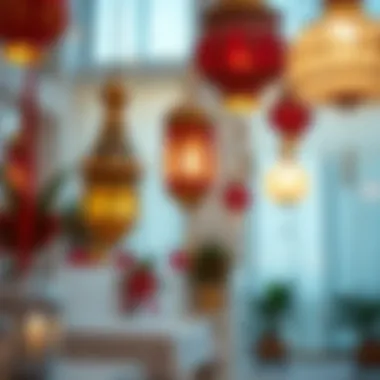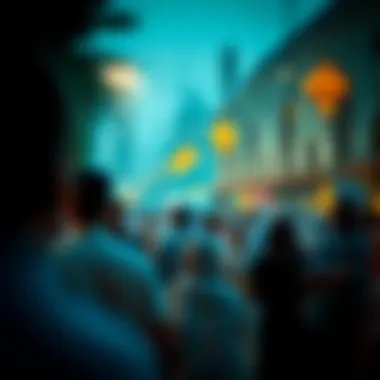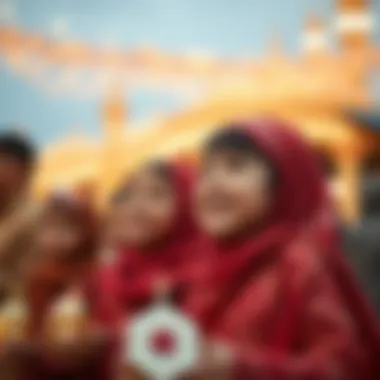Cultural Significance of Eid Celebrations in the UAE


Intro
Eid is a time of joy and celebration, rich in cultural meaning and communal bonding. In the United Arab Emirates, particularly in cities like Dubai and Abu Dhabi, the observance of Eid transcends mere religious significance, manifesting itself in a tapestry of traditions, culinary delights, and vibrant community spirit.
The essence of Eid is deeply ingrained in the fabric of Emirati society. This is not merely a holiday but an event that cements family ties and fosters unity amongst diverse communities. Herein, we explore how Eid is celebrated in the UAE, shedding light on its historical roots, unique local customs, and the ways people come together to mark this important occasion.
Prolusion to Eid
Eid is not just a holiday; it's a vibrant tapestry of traditions, faith, and community woven together by the shared experiences of Muslims around the world. In the United Arab Emirates, this celebration takes on a distinctive flavor, reflecting the nation’s rich heritage and modern spirit. Understanding Eid offers deep insight into the cultural and religious fabric of the UAE, revealing how deeply intertwined these events are with both tradition and contemporary customs.
For the UAE Muslim community, Eid serves as a vital expression of identity and belonging. With every celebration, individuals connect with their roots, honor their ancestors, and reinforce the values that unite them. The experience fosters a strong sense of community and family, which is paramount in a society often characterized by its diversity.
Overview of Eid
Eid comprises two significant festivals: Eid al-Fitr and Eid al-Adha, each steeped in their unique traditions and meanings. Eid al-Fitr marks the end of Ramadan, a month of fasting, reflection, and heightened prayer, while Eid al-Adha coincides with the completion of Hajj, the pilgrimage to Mecca. The observances include prayers, feasting, and acts of charity, emphasizing not just joyous celebrations but also the values of solidarity and gratitude. The significance of these festivals resonates beyond individual experiences; they encapsulate the collective spirit of the Islamic faith.
In the UAE, whether one is experiencing Eid for the first time or as a lifelong celebration, the customs showcase an engaging blend of the past and the present. The beauty of this occasion lies in its inclusiveness, as families gather, friends reconnect, and communities come together in festivities.
Significance in Islamic Tradition
Within Islamic tradition, Eid represents more than just a festive occasion; it signifies spiritual renewal and a time for giving. Eid al-Fitr, for instance, embodies the joy of a successful period of fasting and self-discipline, celebrated through communal prayers that gather thousands in mosques and open spaces. Meanwhile, Eid al-Adha emphasizes sacrifice—commemorating Prophet Ibrahim’s willingness to sacrifice his son in obedience to God. This act is deeply symbolic, urging followers to reflect on their own sacrifices and grace.
"Eid is a reminder of peace, love, and unity, resonating with the core principles of Islam and encouraging all to uplift those less fortunate."
Throughout these celebrations, acts of charity, known as Zakat al-Fitr and Qurbani, are significant as they serve to remind believers of their responsibility to help others, reinforcing the moral fabric of society.
The joyous banter of children, the aroma of sumptuous meals as families gather, and the heartfelt greetings exchanged are all parts of a cultural mosaic that showcases the essence of Eid in the United Arab Emirates. This unique observance not only strengthens bonds among family and friends but also helps in showcasing the nation's cultural identity to the world.
Eid Celebrations in the UAE
Celebrating Eid in the United Arab Emirates holds a distinct position, intertwining deep-rooted traditions and modern-day practices. This topic serves as a vital lens through which one can explore the cultural mosaic of the UAE. Each Eid, whether it be Eid al-Fitr or Eid al-Adha, is not merely a date on the calendar; it signifies moments of reconnection, festivity, and community bonding, which resonate deeply within the Emirati society.
Eid celebrations underscore unity and collective joy, encouraging communal activities and religious observances. The unique blend of tradition and modernization within the UAE is showcased during these festivities, highlighting the country’s evolution while retaining cultural integrity. Additionally, such celebrations can significantly boost the local economy, especially in sectors such as tourism, hospitality, and retail. They create a buzz that attracts both residents and visitors, fostering opportunities for businesses and cultural exchange.
Think of Eid celebrations as a vibrant tapestry woven with intricate threads of history, religion, and social customs, each contributing to a dynamic national identity that beckons individuals from all walks of life to partake in its magnificence.
Eid al-Fitr vs. Eid al-Adha
In the UAE, Eid al-Fitr and Eid al-Adha each have their unique flavors and meanings. Eid al-Fitr marks the conclusion of Ramadan, a month dedicated to fasting and introspection. It is a celebration of breaking the fast and giving thanks for the strength garnered during this period. Families gather, donning their finest attire, and share bountiful meals. This celebration also emphasizes Zakat al-Fitr, a form of charity intended to purify those who fast and aid the less fortunate, ensuring that everyone partakes in the festive spirit.
On the other hand, Eid al-Adha centers on sacrifice, commemorating the story of Prophet Ibrahim’s willingness to sacrifice his son as an act of obedience to God. This Eid involves the ritual of Eid al-Adha prayers followed by the slaughtering of livestock, which further emphasizes sharing and community. The meat is distributed among family, friends, and those in need, reinforcing the principles of generosity and compassion.
Both Eids represent different yet complementary aspects of Islamic faith and practice, each providing opportunities for reflection, gratitude, and social connections that go beyond mere celebration.
Distinctive Features of UAE Celebrations
Eid celebrations in the UAE shine with distinctive characteristics that set them apart from those in other regions. The lavishness seen in the Emirati approach is a blend of cultural heritage and contemporary lifestyles. Grand fireworks light up the skies, especially in cities like Dubai and Abu Dhabi. Public spaces and malls are transformed into festooned setups that exude an atmosphere of revelry, showcasing vibrant decorations and thematic events.


Families often engage in shopping sprees to prepare for Eid, purchasing new clothes, gifts, and traditional sweets. Notably, the Eid market emerges as a flurry of activity, offering everything from traditional maamoul pastries to exquisite gold jewelry, reflecting the rich craftsmanship of the region.
Unique community events include:
- Concerts and performances, showcasing local and international artists
- Fireworks displays that celebrate the festive mood and draw crowds
- Cultural exhibitions, featuring traditional dances, cuisine, and art
Moreover, aside from public celebrations, there exists an intimate side where families come together, share meals, and offer prayers in local mosques, forging deeper connections within the community and enhancing the social fabric of the UAE.
Overall, the UAE's Eid celebrations epitomize a harmonious blend of tradition and modernity, creating an engaging experience that reverberates through every facet of life amidst the grandeur of the nation.
Cultural Traditions During Eid
Celebrating Eid goes far beyond merely marking the end of Ramadan or the willingness to sacrifice during Eid al-Adha. It's steeped in cultural traditions that foster a deep sense of community and strengthen familial bonds within the United Arab Emirates.
Religious Practices
For millions of Muslims in the UAE, Eid represents a time of spiritual reflection, gratitude, and devotion. One of the core elements of Eid is the performance of the Salat al-Eid, a special communal prayer held on the morning of Eid. This prayer typically takes place in large mosques or open fields, drawing together friends, family, and neighbors in a show of unity. As the congregation gathers, a palpable sense of anticipation fills the air. Often, the prayer is followed by a sermon, where the imam reinforces the values of charity, compassion, and community ties.
The act of Zakat, or charitable giving, is especially emphasized during this time, with many making it a point to donate to various causes. This religious practice not only feeds the hungry and supports those in need but also cultivates an atmosphere of gratitude among families and communities.
Through these rituals, participants remind themselves and others about the essence of Eid—a celebration that honors faith while encompassing acts of kindness.
Social Customs
Eid celebrations in the UAE are inherently social. Families gather, friends reconnect, and neighbors visit each other, all fueled by the spirit of unity. It is common to start the day with breakfast, often sharing traditional sweets, like maamoul or baklava, which represent hospitality and sharing.
Visiting friends and family is paramount, and many Emiratis take part in this practice by exchanging Eid greetings, which often include phrases like "Eid Mubarak!"—a heartfelt wish for a blessed Eid. The open-door policy many families adopt during this time ensures that no one feels left out. People often share meals, reminisce about past celebrations, and discuss hopes and plans for the coming months.
Thus, social customs during Eid play a crucial role in binding communities together, reflecting the communal spirit intrinsic to Emirati culture.
Dress and Adornments
Dress code during Eid is a reflection of respect for the occasion and is a significant aspect of the celebrations. Emirati men don traditional garments like the Kandura, while women wear colorful Abayas often adorned with intricate embroidery. This attire isn’t merely a show of culture; it's an expression of identity—a chance for individuals to don their best, showcasing elegance and artistry.
Additionally, it's common to see elaborate jewelry worn by women, with pieces that reflect rich history and culture. Gold, in particular, plays a significant role during Eid. Not only does it serve as adornment, but it may also be given as gifts—symbolizing love and well-wishing.
These dress and adornment practices carry cultural significance, serving as a visual feast that complements the spirit of celebration.
In summary, Eid in the UAE is a tapestry woven from rich religious practices, vibrant social customs, and vibrant attire. Each element plays a part in reinforcing bonds, both spiritual and communal, while highlighting the deep cultural roots of the Emirates.
"Eid is not just a day to celebrate with loved ones, it’s a reminder of the collective strength that community brings."
By delving into these cultural traditions, we gain valuable insights into not only how Eid is celebrated, but also how this celebration reinforces the values at the heart of Emirati society.
Culinary Customs of Eid
Culinary customs hold a special place during Eid festivities, especially in the United Arab Emirates. This is not merely about food; it’s a tactile expression of culture, family, and hospitality. Culinary traditions offer a glimpse into the UAE's rich heritage and the profound connections among families and communities during the Eid celebrations.
The preparations often begin well before the actual celebration day. Gourmets and home cooks alike take to the markets, filling their carts with fresh ingredients and spices, readying themselves for the feast ahead. The experience blends the act of cooking with reverence and love, as meals symbolize the tradition of coming together.


Eid is not simply a time to eat; it’s about sharing the joys that come with the food. Amidst the streets lined with cheerful decorations, one can taste the seasonal changes of flavor, from rich meats to fragrant rice dishes. There are practical considerations as well; families often prepare large quantities to ensure there’s enough for guests, thus embodying the spirit of generosity.
Traditional Dishes
When it comes to traditional dishes during Eid, the UAE presents a vibrant array of flavors and recipes passed down through generations. One of the most iconic dishes is Biryani, a seasoned rice dish often cooked with marinated meat. Each Emirati family may have its unique twist on Biryani, illustrating the rich tapestry of cultures within the country.
Another beloved item on the Eid table is Luqaimat, sweet dumplings drizzled with syrup and often sprinkled with sesame seeds. These delightful treats are not only pleasing to the taste buds but are also a favorite for children. The golden, crispy exterior gives way to a soft, sweet center, creating a comforting bite that speaks of festivity.
Furthermore, Shawarma, while a street food favorite, finds its way into homes during Eid as well. The marinated meat, seasoned with spices, is tenderly cooked and served with fresh vegetables and sauces. Amid the high spirits of Eid, these dishes do more than just fill bellies; they stir reminiscences of collective family gatherings around the dinner table.
Fasting and Feasting
The culinary journey of Eid is framed by the transition from fasting to feasting. Eid al-Fitr marks the end of Ramadan, where fasting is finally dismissed, and it traditionally initiates a period of joyous eating. Families gather, sharing dishes that symbolize the end of a month of self-discipline and reflection. Each bite taken during Eid symbolizes gratitude and a sense of community. The heartiness of meals contrasts significantly with the fasting of the past month, making it all the more meaningful.
On the other hand, Eid al-Adha also brings its own culinary expectations. This celebration dictates Qurbani, or the ritual of sacrificing an animal, with the meat typically being distributed among family, friends, and those in need. This act embodies the spirit of giving and camaraderie, making the post-fasting feast a rewarding event in multiple ways.
"A meal is not just about satiating hunger; it is a vessel for love, tradition, and togetherness."
Thus, the culinary reflections during Eid are steeped in not just sustenance, but in shared memories and newfound connections within the community. As the tables overflow with delicious offerings, every dish serves a purpose far beyond its taste—the sharing of culture, compassion, and warmth in every bite.
Community Engagement During Eid
The concept of community engagement during Eid is not merely a cultural formality; it serves as a backbone for social interactions and solidarity among people in the United Arab Emirates. This time of year emphasizes values such as generosity, love, and compassion, turning the focus outward, towards family, friends, and the broader community. Essentially, Eid becomes a canvas where relationships, old and new, are painted with bonds of support and shared experiences. It's a moment where people strap on their community hats, so to speak, and engage in activities that resonate deeply in their cultural and social fabric.
Charity and Giving
Charity during Eid holds a place of prominence. It's more than just a tradition; it's a commitment to uplift those in need. The practice of giving during this season, often formalized as Zakat al-Fitr, ensures that everyone can partake in the celebrations, regardless of their economic standing. It’s a practice that springs from the belief that a community should support its members, particularly those who are less fortunate.
- Individuals often donate money or items to local charities.
- Many choose to provide food hampers to families struggling to make ends meet.
- Larger events are organized where food is distributed to the homeless or underprivileged.
This charitable spirit creates a ripple effect, fostering a sense of unity and responsibility within neighborhoods. People gather to contribute, attend events, and collaborate, embodying the essence of togetherness and compassion that Eid advocates.
Public Celebrations and Events
Public celebrations during Eid in the UAE are nothing short of spectacular. Local governments and communities put effort into orchestrating events that not only reflect the tradition but also welcome international influences, creating a vibrant, inclusive atmosphere. From fireworks lighting up the night sky to live performances and community fairs, the scale and diversity of celebrations are remarkable.
Key features of these events include:
- Cultural shows: These often showcase art, music, and traditional dance, allowing Emirati culture to take the center stage.
- Family-friendly activities: Various activities, like face painting or games, cater to kids, ensuring that every member of the family can enjoy Eid.
- Food stalls: Local cuisines and international dishes come together, offering a gastronomic experience that entertains both locals and tourists.
"The spirit of Eid is not just observed; it’s lived out loud in public spaces of the UAE."
Engagements like these provide an essential space for both social interaction and the mixing of cultures—a true testament to the UAE’s cosmopolitan identity. As families gather, friendships are strengthened, and new acquaintances are formed, encapsulating the joy and camaraderie that Eid brings. In a way, one could say that Eid in the UAE transforms from a religious observance into a vibrant social phenomenon, highlighting the intrinsic value of community engagement.
Impact of Tourism on Eid Celebrations
Tourism plays a pivotal role in shaping the character of Eid celebrations in the United Arab Emirates. As the nation becomes a melting pot of cultures, the festive period not only retains its religious essence but also transforms into a global celebration. This mixture at times brings both challenges and benefits.
International Participation


Among the most notable aspects of Eid in the UAE is the sheer volume of international visitors who join the local population in the festivities. During this celebratory period, cities like Dubai and Abu Dhabi become vibrant with tourists engaging in various activities. Events such as concerts, cultural exhibitions, and fireworks light up the skies, offering visitors an opportunity to immerse themselves in the local traditions.
Tourists partake in traditional meals, visit mosques, and participate in community events, which enhances their understanding of the Emirati culture. This inclusion fosters an environment of shared joy. Not to mention, hosting events that attract global attention can also highlight the city’s hospitality sectors, thus boosting local businesses.
- Cultural Festivals: Festivals often feature live music, performances, and art displays.
- Culinary Experiences: Food markets showcase traditional dishes attracting food enthusiasts.
- Shopper’s Paradise: Many locals and tourists hit the malls during Eid, making the shopping experience lively and colorful.
"Eid is not just a celebration; it's an invitation to experience a culture filled with warmth and hospitality."
Cultural Exchange and Understanding
The mutual interaction between Emirati traditions and diverse cultures during Eid brings forth rich cultural exchange. International visitors find themselves not only spectators but active participants in various rituals. This cross-cultural engagement does wonders in nurturing international relations and understanding among people.
Musical performances might be fused with traditional Emirati tunes, creating a unique blend that reflects both heritage and modern influences. Educational workshops on Eid’s significance for tourists also thrive, often organized by local cultural institutions. Through these workshops, people learn about
- the essence of Zakat (charity),
- the tradition of family gatherings, and the spiritual importance behind the festivities.
This exchange showcases not just the vibrancy of heritage but also enlightens others about the significance of compassion, community, and unity - values that are central to the celebration of Eid.
Challenges and Observations
Modernization of Traditions
In an increasingly globalized world, Eid is experiencing a shift that intertwines traditional practices with modern influences. This modernization poses a number of challenges. Many Emiratis find themselves in a tug-of-war between holding onto historical ways of celebrating and embracing contemporary methods that resonate with younger generations.
Important considerations include the impact of technology on how Eid is celebrated. Social media platforms, for instance, serve as a double-edged sword; they promote connectivity and the sharing of festivities but might dilute the essence of personal gatherings and community ball. People are more inclined to post highlight reels of their celebrations online rather than immersing themselves in the rich traditions.
Moreover, there’s a notable rise in commercialism associated with Eid, where the focus shifts toward elaborate gifting and lavish parties instead of spiritual reflection and communal bonding.
On the flip side, modernization has also allowed for creative expressions of Eid celebrations, such as innovative decorations and fusion cuisine that showcase the UAE's rich cultural diversity. These aspects echo the global nature of today’s celebrations while building a unique Emirati blend that honors both tradition and modernity.
Social Changes Affecting Celebrations
In addition to modernization, various social changes have also impacted how Eid is embraced in the UAE. With shifting demographics due to increased immigration, the cultural fabric of the nation continues to experience a rich blend of traditions. For instance, expatriate communities contribute to the celebratory practices by incorporating their unique cultural customs, effectively creating a melting pot of festivities.
The fast-paced lifestyle that many residents lead today has led to a re-evaluation of how Eid is celebrated. It's becoming more common for individuals to prioritize convenience, favoring large-scale public events over intimate family gatherings. While public festivities foster community spirit, they might lead to less meaningful connections with family members or close friends.
Furthermore, the expansion of online shopping and delivery services signifies that many choose to celebrate Eid by exchanging gifts via digital means rather than personal interactions. What was once a chance for families to come together to shop and share meals is now often reduced to a click of a button.
As the Emirati population continues to evolve, so too does the way in which they observe significant events like Eid. It will be important to keep the pulse on how traditions adapt to these shifts, ensuring the core values of togetherness and gratitude remain central to the celebrations.
The future of Eid celebrations in the UAE thus hangs in the balance, where respect for time-honored traditions must harmonize with the realities of modern living, all the while maintaining a sense of identity within a diverse social landscape.
Finale
Reflections on Eid's Significance
Eid is not just a religious event; it embodies the essence of giving, gratitude, and reflection. It brings families together, forging memories and strengthening relationships through shared practices. The spirit of generosity is palpable, whether through the act of giving Zakat (charity) or the communal gatherings centered around extravagant feasts. The societal implications are clear: Eid fosters a sense of belonging and reinforces cultural values that are vital to the identity of the UAE’s people.
This holiday enhances not only familial ties but also bridges gaps among various cultural groups within the UAE. As expatriates partake in the festivities, they contribute to a rich tapestry of multicultural interactions that exemplify tolerance and unity.
Future of Eid Celebrations in the UAE
Looking ahead, the celebration of Eid in the UAE is poised for evolution. As demographics shift, younger generations will mold the observance of Eid, infusing it with contemporary practices while maintaining traditional roots. The role of technology is undeniable; social media platforms will likely amplify the celebratory aspects, enabling wider participation, especially among the diaspora.
Moreover, the impact of global events, such as the pandemic, has shifted how communities come together. Drive-through Iftar events and virtual gatherings may spearhead new traditions that uphold the festive spirit while safeguarding public health. This adaptation signals a resilient culture, capable of facing challenges while celebrating its rich heritage.















